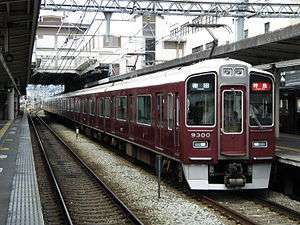Hankyu 9300 series
The Hankyu 9300 series (阪急電鉄9300系) is an electric multiple unit (EMU) train type operated in Japan by the private railway operator Hankyu Railway since 2003.[1]
| Hankyu 9300 series | |
|---|---|
 A 9300 series first build train on a limited express service, October 2008 | |
| In service | 2003– |
| Manufacturer | Hitachi Alna Sharyo (set 9308) |
| Family name | Hitachi A-train |
| Replaced | 2300 series, 6300 series |
| Constructed | 2003–2010 |
| Number built | 88 vehicles (11 sets) |
| Number in service | 88 vehicles (11 sets) |
| Formation | 8 cars per trainset |
| Operator(s) | Hankyu Railway |
| Depot(s) | Katsura |
| Line(s) served | Hankyu Kyoto Main Line |
| Specifications | |
| Car body construction | Aluminium alloy, double-skin |
| Car length | 18,900 mm (62 ft 0 in) |
| Width | 2,800 mm (9 ft 2 in) |
| Height | 4,095 mm (13 ft 5.2 in) |
| Doors | 3 pairs per side |
| Maximum speed | 115 km/h (70 mph) |
| Traction system | Variable frequency (IGBT) |
| Electric system(s) | 1,500 V DC overhead catenary |
| Current collection method | Pantograph |
| Bogies | FS-565 (motored) FS-065 (trailer) |
| Braking system(s) | Regenerative brake Electronically controlled pneumatic brakes |
| Safety system(s) | ATS, ATC |
| Coupling system | Shibata-Type |
| Multiple working | 7300 series |
| Track gauge | 1,435 mm (4 ft 8 1⁄2 in) |
Operations
The 8-car 9300 series trains operate on the Hankyu Kyoto Main Line, primarily on limited express services.[1][2]
Formations
As of 1 April 2012, the fleet consisted of eleven eight-car sets formed as follows, with three motored (M) cars and five non-powered trailer (T) cars.[2]
| Car No. | 1 | 2 | 3 | 4 | 5 | 6 | 7 | 8 |
|---|---|---|---|---|---|---|---|---|
| Designation | Mc1 | T1 | T2 | T2 | T2 | T1 | M1 | Mc2 |
| Type | Mc9300-1 | T9850 | T9870 | T9870 | T9870 | T9850 | M9800-1 | Mc9400-1 |
| Numbering | 9300 | 9850 | 9870 | 9880 | 9890 | 9860 | 9800 | 9400 |
The "Mc1" and "M1" cars are fitted with two single-arm pantographs.[2]
- 9300 series third build train, July 2013
Interior
Passenger accommodation consists of transverse seating, with longitudinal bench seating at the car ends.[1]
- Transverse seating in a 9300 series train
- Longitudinal seats
gollark: Well, your timezone is the same as theirs, and we know yours.
gollark: People can pretend to be other people.
gollark: I think.
gollark: Quite easily.
gollark: I got it from apiospace.
References
- 私鉄車両年鑑2012 [Japan Private Railways Annual 2012]. Tokyo, Japan: Ikaros Publications Ltd. February 2012. p. 74. ISBN 978-4-86320-549-9.
- 私鉄車両編成表 2012 [Private Railway Rolling Stock Formations - 2012]. Japan: Kotsu Shimbunsha. July 2012. p. 141. ISBN 978-4-330-29911-2.
External links
| Wikimedia Commons has media related to Hankyu 9300 series. |
- Hankyu 9300 series (Japan Railfan Magazine Online) (in Japanese)
This article is issued from Wikipedia. The text is licensed under Creative Commons - Attribution - Sharealike. Additional terms may apply for the media files.